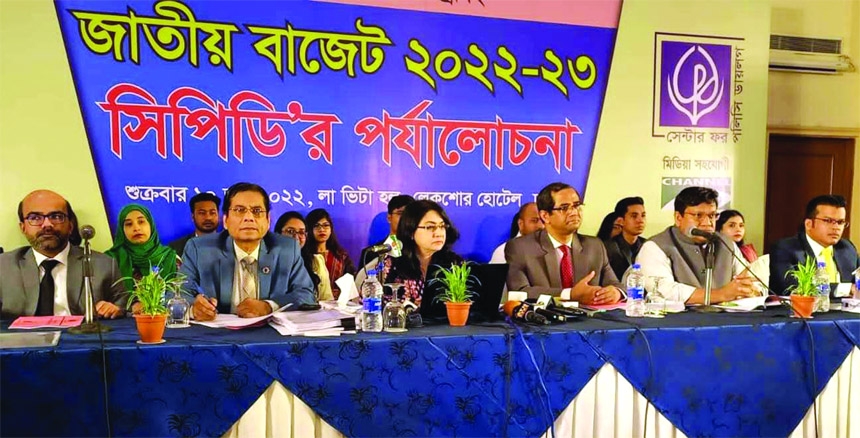
Staff Reporter :
The Center for Policy Dialogue (CPD), a private think-tank, said that the proposed budget for fiscal 2022-23 fails to address adequately the inflationary issues facing the country and assure citizens of stability in food prices.
At a time when the ripple effects of the Ukraine war are gradually being felt through price volatility and exchange rate swings, the budget purports to provide more support to higher-income groups while keeping the low and middle-income groups at bay, according to the think tank.
It also said there is no good news for lower and middle-income groups in the newly announced budget, voicing doubt about government’s ability to lower the inflation rate at 5.6 per cent.
The CPD’s reaction on Friday came a day after Finance Minister AHM Mustafa Kamal unveiled a Tk 6.78 trillion spending plan for the fiscal year beginning on July 1.
Experts and economists believe the inflation has hit over 10 per cent.
As a result, lower, middle class and fixed income groups will face challenges to run their family as the commodity prices are unlikely to come down.
Kamal’s fourth national budget, equivalent to 15.23 per cent of the national GDP, is over 14 per cent higher than the revised outlay for FY22.
However, the budget runs a deficit of Tk 2.44 trillion, 5.5 per cent of the national GDP, much of which will be offset by heavy borrowings from domestic and external sources.
The revenue target has been increased to Tk 4.33 trillion which is 9.8 per cent of GDP. But public expenditure is projected to grow faster than revenue mobilisation, according to CPD.
“The prices of all kinds of goods including fuel oil and food products are increasing in the international market. Commodity prices have been rising in the world market since the Covid-19 situation began to normalize,” said Dr Fahmida Khatun, executive director of the CPD.
She said, “The budget has not taken adequate steps to reduce the prices of essential commodities. It was necessary to reduce the prices of 29 commodities including rice and pulses, but it did not happen. The CPD had recommended a reduction in taxes to reduce the prices of commodities. But that too was not kept.”
Though the finance minister mentioned the economic challenges, he did not mention the pathway to face the challenges, she said.
The private sector credit growth that has been set at 15 per cent would be affected if the government borrows from the banking system to meet the budget deficit, the CPD said.
Kamal’s expectation that exchange rate will be Tk86.2 for per US dollar on an average in FY 23 does not reflect the reality on the ground. Mentioning that how the target would be achieved is not explained in the budget, the think tank, however, appreciated the budget for increasing subsidies in the agriculture sector and food production.
But it noted that there is no allocation for the youth employment and skills development in the budget, though the age of around 57 percent of the population is below 25 years.
The CPD urged the withdrawal of tax on English medium schools and import of foreign books and journals. Many middle class families send their children to English medium schools and they require tax exemption as it involves knowledge and education.
Dr Fahmida Khatun said the provision for whitening the smuggled money is not good for the economy at all. She also termed options of smuggling money abroad and bringing it back both are completely immoral.
She said bringing laundered money back home won’t be feasible.
The move, she said, will discourage the regular tax payers. On the other hand, there will be no tax exemption for the poor, she said.
Replying to a query Professor Mustafizur Rahman said if the provision is kept to legalize laundered money in such a way, an illegal system will be legal and an organized group may be encouraged to launder illegally-earned money out of the country.
He said individual taxpayers are paying tax around 25 percent, corporate tax payers paying around 40 per cent tax, then 15 per cent tax for legalizing illegal money is really discouraging for the legal tax payers, he said.
Khondaker Golam Moazzem, research director, Towfiq Islam Khan, senior research fellow, Syed Yusuf Saadat, research associate of CPD, among others, also spoke on the different aspects of the proposed budget.

